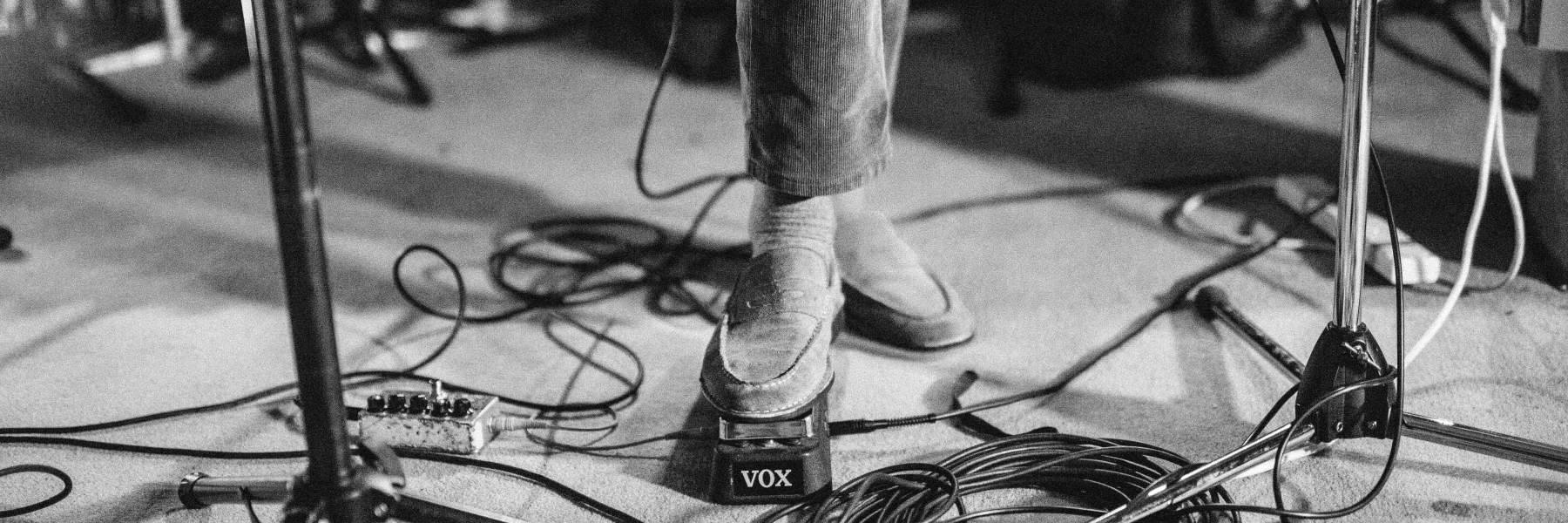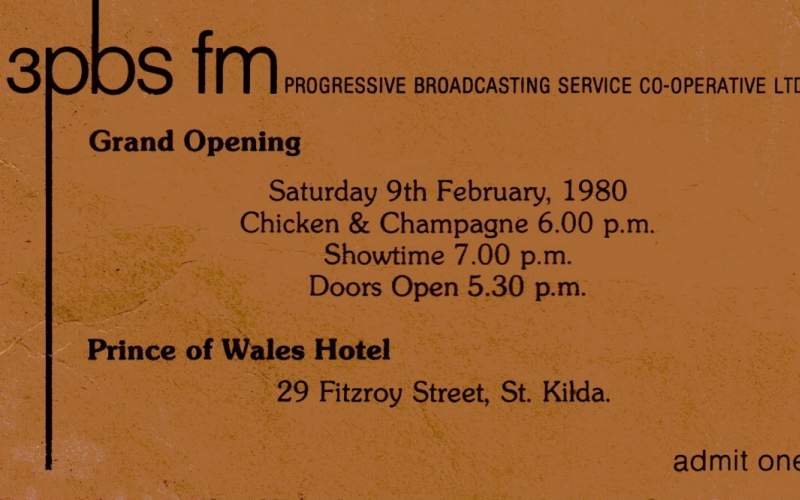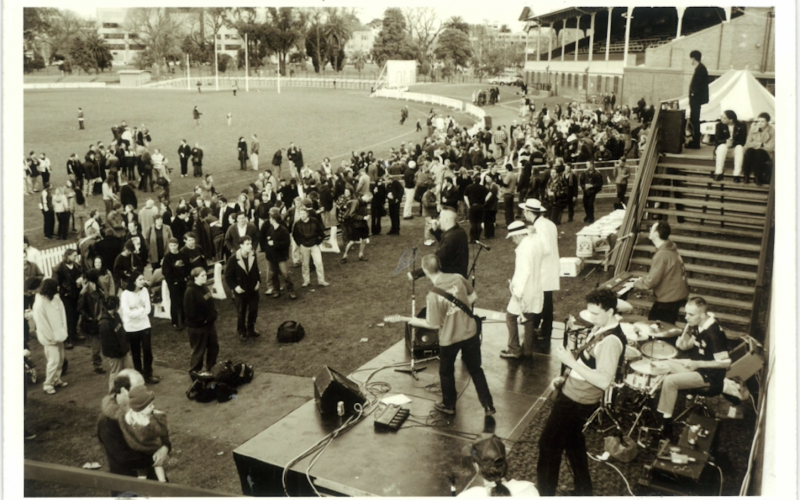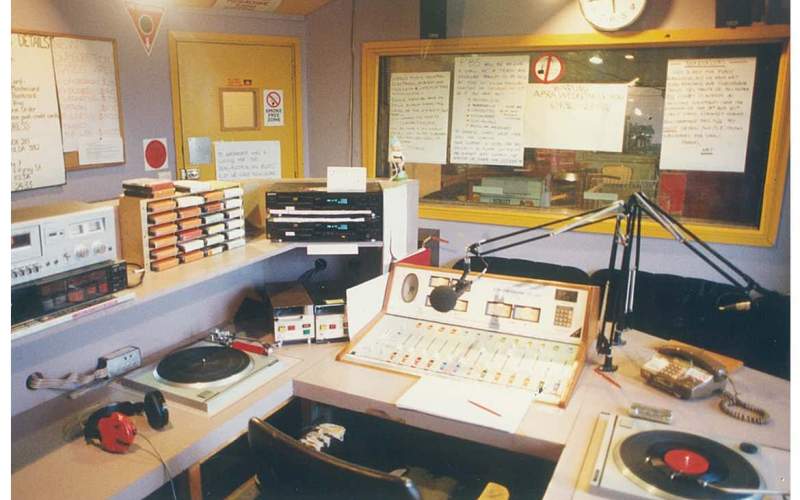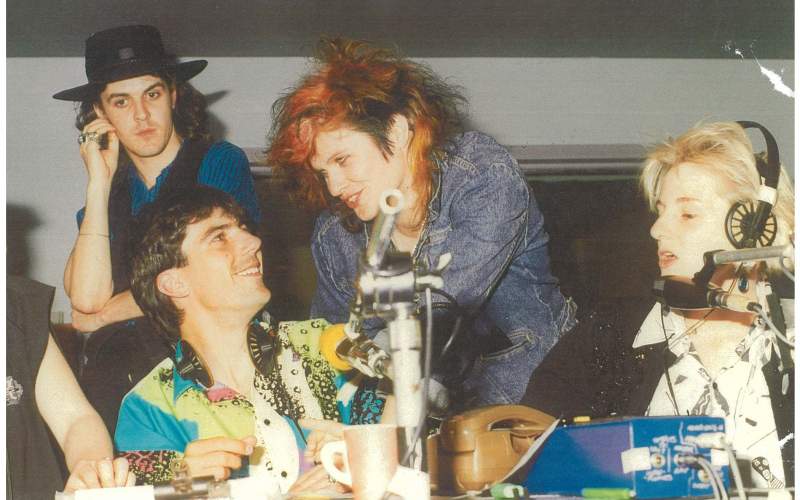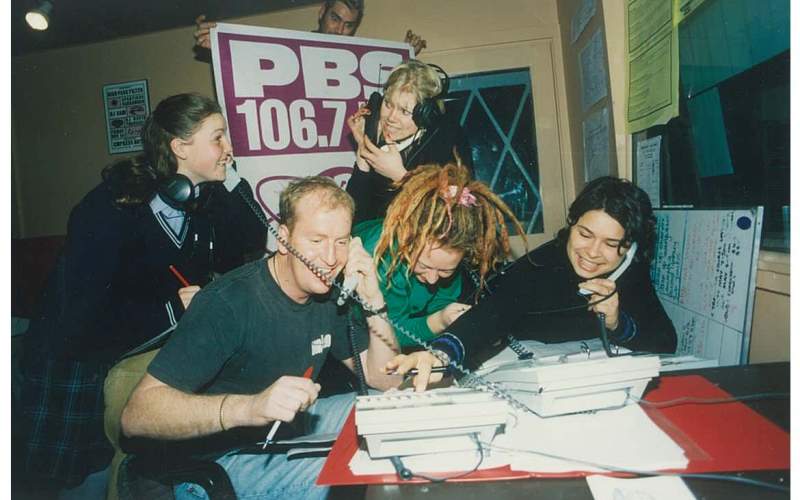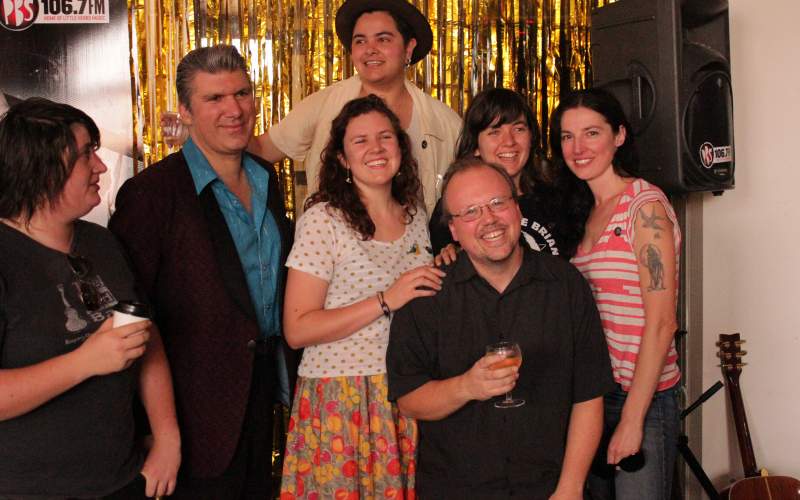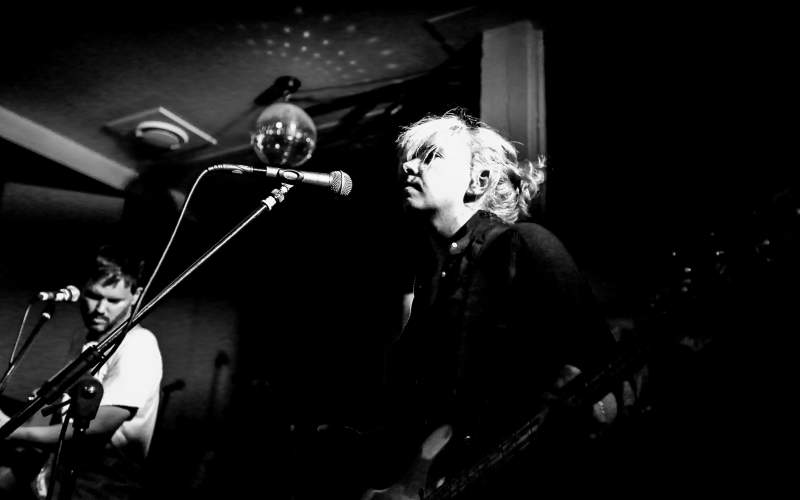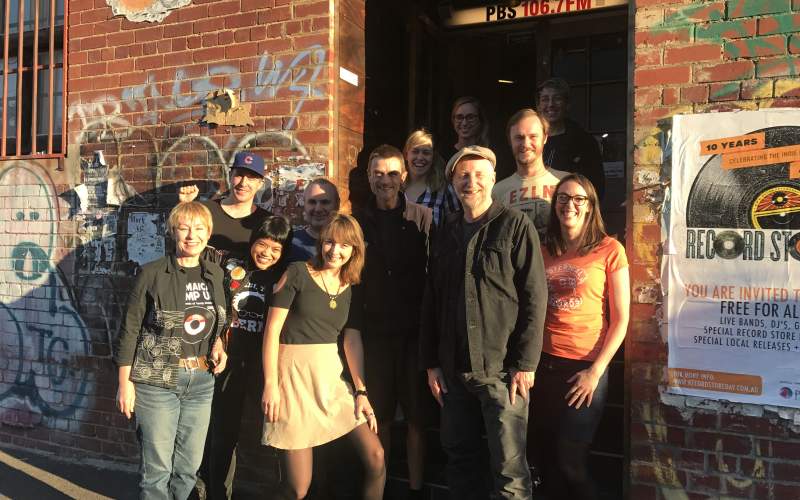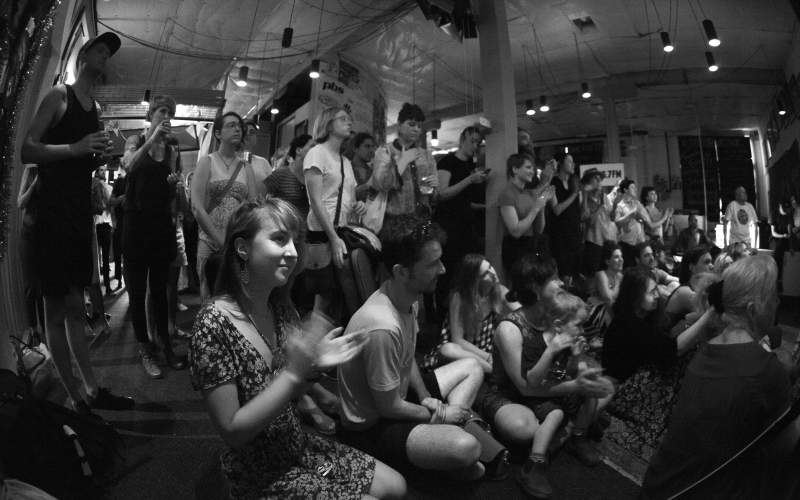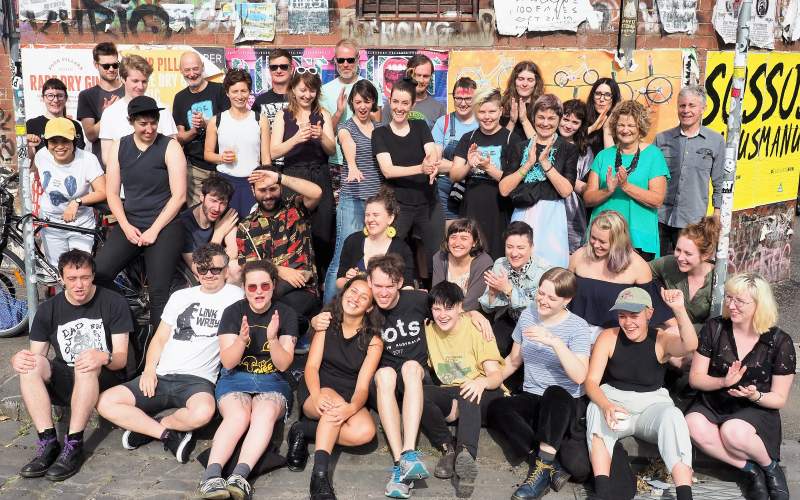From humble backyard beginnings, to our first home in St Kilda, to our current residence in Collingwood, PBS has played a unique and essential role in Melbourne's music landscape.
The idea of creating a cooperative, community radio station to support under-represented music in Melbourne was hatched in the mid-late 1970s. Music lovers Felix Hoffman and Peter Jetson were both acutely aware of Melbourne's desperate lack of quality, community-driven radio, and had separately tried to enlist support for a new station. These two enthusiastic individuals joined forces and began searching for more like-minded music-loving weirdos.
By December 1976 a group of 50 people had been rounded up in service of the Progressive Broadcasting Service. Attendees at the inaugural PBS meeting came from a variety of backgrounds - doctors, dentists, and technicians rubbed shoulders with punks and musos. These people were "dissatisfied with the 'Pops & Classical' approach of current broadcasters ... and decided to try a fresh approach" (Waves, April 1978). Their vision of the station was fleshed out through issues of Waves magazine, a newsletter launched in 1977 where these idealists could conceptualise PBS as a counterpoint to the "sea of banality" of the dominant mass media of the time ("Drowned in a sea of banality", Waves, April 1978).
"We are about to witness - are witnessing - the dawn of a new age in radio communication. No longer is it adequate, or justified to simply 'rubber stamp' all media as corrupt or running counter to the well-being of the community they serve."
- Allan Quirk, "RADIO: The 'Hot' Medium", Waves, Vol.1, No.5, October 1977.
PBS was about to change Melbourne's music radio landscape, creating space for little-heard music and underrepresented voices, combating the isolation of living in a sprawling city.
After obtaining a broadcasting licence in October 1978, PBS began regular broadcasting at 4.30pm on the 21st December 1979, via a studio at the Prince of Wales hotel in St. Kilda and a transmitter on the roof of the Royal Women's Hospital in Carlton. Since then, the station has continued to grow as an integral part of Melbourne's diverse music industry. Championing Australian music since before it was cool, the PBS program grid showcases the diversity of contemporary music and supports emerging local bands and musicians. Countless musos and broadcasters cut their teeth at PBS, whether by presenting a graveyard show, volunteering on the front desk or being interviewed on air.
PBS TIMELINE
December 1976
First meeting of the Progressive Broadcasting Service
July 1977
First test transmission - PBS goes to air for the first time with 78 hours of continuous broadcasting
October 1978
PBS offered a special interest licence
21st December 1979
First broadcast from Prince of Wales hotel studio: "Good afternoon, the time is 4.30pm on Friday December 21st and this is 3PBS-FM commencing regular transmission on 107.7 MHz"
1980
The first live-to-air PBS outside broadcast - Big FM Broadcast of 1980, Dallas Brooke's Hall.
1984
PBS commences move to Fitzroy street studio
November 1987
PBS secures transmitter site at Mt Dandenong and begins broadcasting 24 hours on 106.7fm
March 1988
First International Women's Day celebration on PBS
April 1988
Inaugural Live Music Week
1990
First all-woman broadcast for International Women's Day
1997
First simultaneous broadcast over the internet for Radiothon - which lead to the first international subscribers
2001
Move to Easey Street Collingwood
2002
First Studio 5 Live broadcast
2003
PBS magazine renamed Easey
2006
First broadcast of The Morning Spread breakfast show
2009
30th anniversary reunion of announcers, volunteers, staff, board members and supporters
2010
SLAM rallies - PBS, RRR, 3CR simulcast to support live music venues
April 2011
PBS and eight other Melbourne community stations launch their digital radio services with a joint simulcast from Fed Square
2015
A third broadcast studio is commissioned at Easey street with generous support from the local community
1st November 2016
PBS diverges FM and DAB+ broadcasts with the first edition of Cross Pollinate hosted by participants in the Access Training Program
2019
To celebrate and commemorate a 40-year milestone, PBS released the book 'PBS 40 Years of PBS Radio', detailing the rich and diverse history of the station and the music community. Lovingly compiled it featured firsthand accounts, rare photos, posters and historical artefacts. On the same night of book launch, PBS was inducted into the Music Victoria Hall of Fame. PBS launched its 'Make It Home' fundraiser to raise money for its big move to Collingwood Yards. The fundraiser ran until 2022.
2020
Covid-19 pandemic sweeps across the world. For the first time ever, PBS closes its doors to non-broadcast volunteers and the public. Most of its staff work from home, a shoestring staff remain on site - closely following Covidsafe protocols. PBS announcers keep the tunes going 24/7 and loyal listeners show their support with text messages, emails, letters, memberships and donations. Whilst this is happening, PBS is in the process of building a new station thanks to the generous support of members and donors
2021
Move to new studios in the Collingwood Arts Precinct. On December 14, PBS switched from Mz Rizk's Boogie Beat Suite at 47 Easey Street to Jan Dale's Southern Style, commencing test broadcasting from Collingwood Yards. PBS magazine renamed Waves. In a year that had marked high points against the backdrop of the Covid-19 pandemic, we had some of our very saddest times as we farewelled long-term broadcasters Pierre Baroni and David Heard (volunteer since 1979)
2022
Long running General Manager, Adrian Basso resigned. PBS' new GM, Kristen Paterson, began work on Monday August 23.
2023
Drive Live and Studio 5 Live returned after a break due to the COVID pandemic. Jurgen Schaub stepped down as PBS Chair, and was replaced by Lauren O'Dwyer.
August 29, 2023
PBS launched its new five year Strategic Plan.
March 25, 2024
Lauren O'Dwyer stepped down as PBS Chair.
"What has remained solid as a kick drum beneath a shifting melody is the spirit that drove a bunch of people from punks to doctors and engineers, to create a station in 1979 playing 'little heard' music"
- Steph Francis, "30 Years of PBS", Easey, May 2009
Many things have changed since 1979, but PBS' desire to support underrepresented music remains central to everything we do. Learn more here...
The Mick Geyer Award
The Mick Geyer Award is given in recognition of an individual’s outstanding service to PBS and, through that, to the broader music community. Mick Geyer was a broadcaster journalist and manager in the Melbourne music scene from the 1980s until his death in 2004. His influence was widespread but remained largely hidden from public view. His passion for music and contemporary culture formed the foundation for his influence. With a personality to match his formidable range of interests, Mick made a lasting impression on many people, often moving from interviewer to friend in a single conversation. At PBS he was a broadcaster and editor of the former station magazine WAVES. Amongst many musicians he was a catalyst to musical discovery through conversation and his legendary cassette tape compilations. He was a writer of epic press releases. He always strove to keep the station true to its musical foundations and challenged orthodoxy and complacency. He left a lasting legacy to the station.
The award is given in recognition of an individual’s specific and sustained contribution to PBS over a number of years and serves to honour the wonderful memory of Mick Geyer.
Previous recipients: 2011 Pete Merrett, 2012 Mike Glover, 2013 David Heard, 2014 Vince Peach, 2015 Helen Jennings, 2016 John Carver, 2017 Jan Dale, 2018 Maddy Mac, Pierre Baroni in 2019 and Phil MacDougall in 2025.
